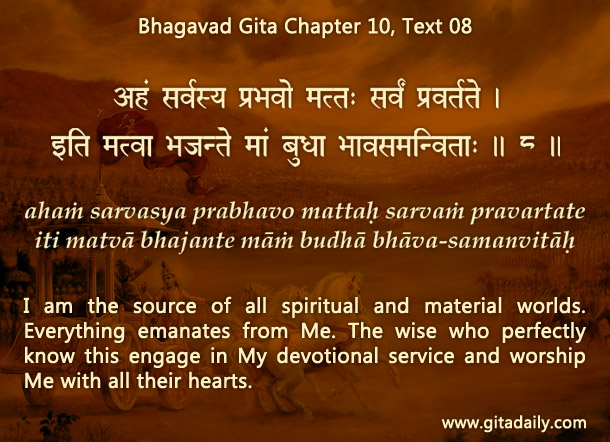Suppose we are driving to some destination and come to a fork. If we are unsure about which way to go, we will move slowly or not move at all. But even if we are sure, that conviction alone will not take us ahead – we need to drive ahead.
A similar dynamic applies to our spiritual practice. Spiritual growth is essentially a journey of the heart from worldly objects to Krishna. Such a journey requires philosophical conviction. When we have to choose between some worldly object and Krishna, we may feel indecisive. The Bhagavad-gita is like a map, a guidebook to happiness. By studying it, we understand that Krishna is the source of everything (10.08) – thus, he is the source of the attractiveness of all worldly objects, including the one that is presently attracting us (10.41). So, by becoming devoted to him, we won’t lose the pleasure coming from that object; we will access the source of that pleasure and relish joy in its fullness.
When we thus understand Krishna’s all-attractiveness, we feel convinced to choose him. But that conviction alone doesn’t take us to him – it aids us in redirecting our heart towards him and cultivating attraction for him. By practicing bhakti-yoga and investing whatever devotional emotion we have in Krishna, we gradually sense his reciprocation in the form of satisfaction and purification. This inspires us to further invest our emotion in him, thereby relishing his greater reciprocation.
The resulting redirection of heart culminates in life’s ultimate perfection: the ecstasy of endless love. Progress towards this perfection is facilitated by the choice of the head, but is executed by the calling of the heart, the calling that unites the human heart with the divine heart in a bond of eternal love.
To know more about this verse, please click on the image
Explanation of article:
Podcast:


Hare Krsna CCD,
Wonderful thought and insight.
BHAKTI is mandatory for the progress of head and heart
Hare Krishna CCD. Excellent thought and excellent explanation. Really we should appreciate creator of the attractiveness in materialistic things rather than appreciating the materialistic things.
Thanks for the kind words and the thoughtful comment.
ys
ccdas